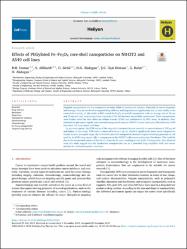Effects of PEGylated Fe-Fe3O4 core-shell nanoparticles on NIH3T3 and A549 cell lines
Özet
Magnetic nanoparticles are key components in many fields of science and industry. Especially in cancer diagnosis and therapy, they are involved in targeted drug delivery and hyperthermia applications due to their ability to be controlled remotely. In this study, a PEG-coated Fe/Fe3O4 core-shell nanoparticle with an average size of 20 nm and 13 nm and high room temperature coercivity (350 Oe) has been successfully synthesized. These nanoparticles were further tested for their effect on cellular toxicity (IC50) and proliferation by WST assay. In addition, their potential as anti-cancer agents were assessed using scratch assay in NIH3T3 mouse embryonic fibroblast and A549 non-small cell lung cancer cell lines. In previous reports, the IC50 values of the magnetite nanoparticles are reported at concentrations of 100 mu g/ml and higher. In this study, IC50 value is observed to be at 1 mu g/ml, which is significantly lower when compared to similar studies. In scratch assay, the Fe/Fe3O4 core-shell nanoparticle showed a higher inhibitory potential on cell motility in A549 lung cancer cells in comparison to the NIH3T3 cells mouse embryonic fibroblasts. This could be due to the accelerated release of free Fe ion from the Fe core, resulting in cell death. Consequently, data obtained from this study suggest that the synthesized nanoparticles can be a potential drug candidate with anti-cancer activity for chemotherapeutic treatment.

















